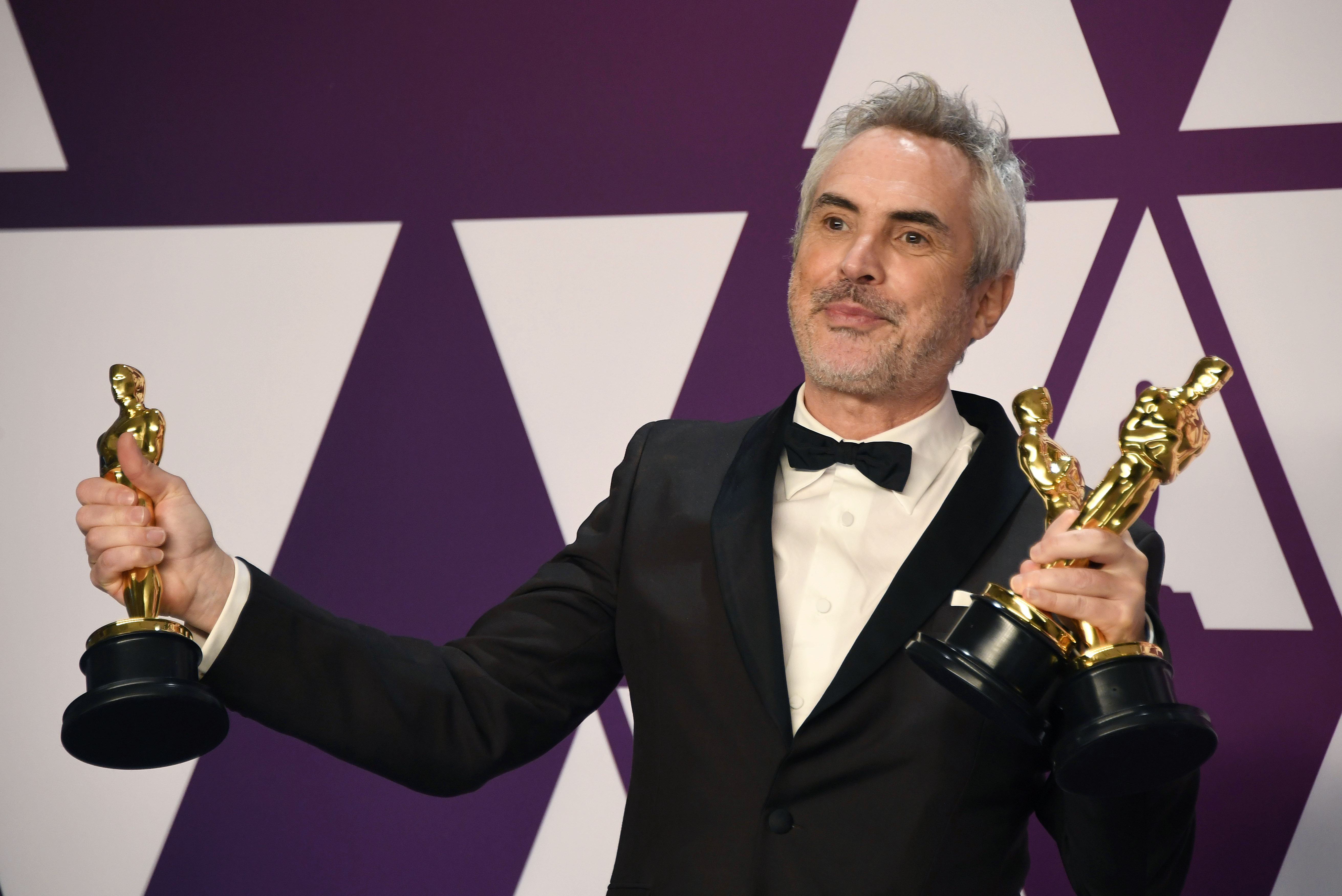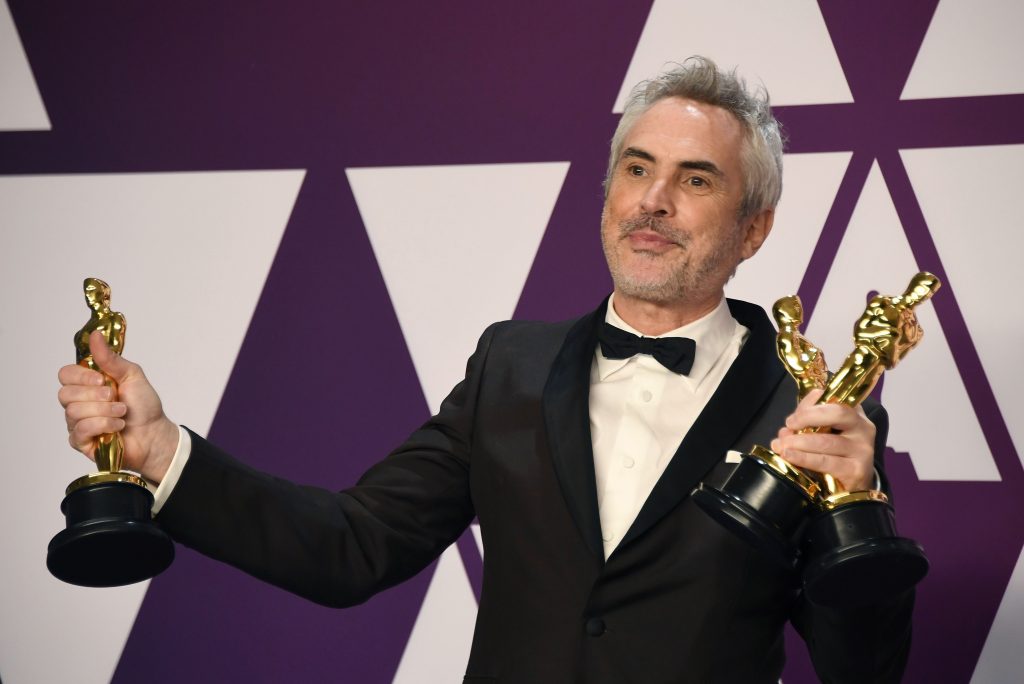This year’s Oscars ceremony may not have ended with what would have been an historic win for Roma as Best Picture, but the Alfonso Cuarón film did manage to break a couple of records with its three wins. Scoring statues for Best Cinematography, Best Foreign Language Film and Best Director, the black-and-white period film spoken in Spanish and Mixtec was part of a rather multicultural telecast. There were various firsts, with Black Panther’s costume and production designers becoming the first black women to win in their category; female filmmakers dominating the Shorts races; and winners like Rami Makek (Best Actor for Bohemian Rhapsody) speaking powerfully about being the child of immigrants in this country.
Moreover, in between appearances and speeches by Diego Luna, Alfonso Cuarón, Guillermo de Toro and Javier Bardem, there was plenty of Spanish to be heard throughout the telecast. So much so that by the time Luna joined chef José Andrés on stage to present a clip from Roma, he went off-script in Spanish (“Buenas noches,” he quipped, “Ya se puede hablar Español en los Oscars!”) before being nudged back into their scripted banter.
If you missed Hollywood’s biggest and breeziest night (the host-less telecast moved at a workmanlike pace, barely letting winners finish their speeches and rushing off everyone on stage so that viewers could watch yet another Rolex commercial) we’ve got you covered. From record-breaking wins by Roma to glittering moments in the audience, find below all the Latino highlights from the show.
JLo Steals the Red Carpet, Predictably
When Jennifer Lopez arrives at a red carpet, you know you’re in for a treat. She’s yet to be nominated for an Oscar (#JusticeforSelena) but she won the night with her disco ball-inspired dress, which she sported on stage while presenting Best Cinematography with a perfect accessory: Captain America himself, Chris Evans.
Cuarón Makes History
Roma’s first win found Cuarón making history: he became the very first director to win this category for serving as his own Director of Photography. Saluting his past collaborator (who won his own first Oscar for Cuarón’s Gravity), the Roma director accepted his third ever Academy Award by rephrasing a famous sign Billy Wilder had in his office (“What would Lubitsch have done?”) instead asking, “What would Chivo Lubezki have done?”
Cuarón’s quip not only put Lubezki’s work in conversation with a long storied Hollywood history but rightfully put the work of the Mexican cinematographer — who was originally supposed to shoot this black-and-white period piece – alongside those icons of classic Hollywood.
Javier Bardem Speaks Out Against Walls
Before presenting the Best Foreign Language Film to Roma, alongside Angela Bassett, Spanish Oscar winner Javier Bardem made a powerful statement about the the need to fight back against the rhetoric of walls and division. “There are no borders, there are no walls, that can stop ingenuity and talent,” he said while acknowledging that this category celebrates the work of filmmakers from around the world. “Tonight we celebrate the excellence and importance of the culture and the language of other countries.” Oh, and did we mention he did it all in Spanish?
Mexico (Finally) Wins Its First Foreign Language Film Award
It took nine nominations (including recent films by Cuarón’s fellow Three Amigos Pan’s Labyrinth and Biutiful) but Mexico took its first-ever Best Foreign Language Film win!
And an effusive Javier Bardem couldn’t hide his excitement when opening the envelope. Echoing Bardem, Cuarón thanked his home country and his leading ladies before extolling the virtues of the international language of cinema: “When asked about the New Wave, Claude Chabrol said there are no waves, there is only an ocean. I think that the nominees tonight have proven that we are a part of the same ocean.”
An Afro-Latino Spidey Wins
Bucking the Disney-Pixar bias that tends to greet this category, the filmmakers behind Spider-Man: Into the Spider-Verse prevailed over the competition to win Best Animated Feature Film and got in a reference to the effect Miles Morales is having on audiences. “There’s 800 filmmakers that pushed boundaries and took risks to make people feel powerful and seen,” Christopher Miller said. “So when we hear that somebody’s kid was watching the movie,” Cuban-American Phil Lord added, “and turned to them and said, ‘He looks like me. They speak Spanish like us’. We feel like we already won.”
Diego Luna Salutes Roma
To present every Best Picture, the Academy invited people not associated with the films nominated. Taking on Roma duties were Cuarón’s Y Tu Mamá También star Diego Luna (sporting a Mexican flag pin) and famed chef José Andrés. “This is a story of lonely women and absent men,” Luna said.
The Spanish-American chef went one further, noting that the film gives a voice to the voiceless and reminds us of the compassion we owe the invisible people in our lives: immigrants and women, “who move humanity forward.”
Tessa Thompson Ribs Her Creed Co-Star
Panamanian-Mexican-American Tessa Thompson joined Michael B. Jordan on the stage to present Best Original Score. The Creed duo got in one of the most charming banter exchanges of the night, all about how the score of a film can make you feel like you’re in a movie. Like how the Jaws theme can make you want to get out of the water because something bad is about to happen. Or how the Titanic score can make you want to get out of the water because bad is about to happen. The fun back-and-forth even set up Thompson to ask Jordan whether he knew how to swim, poking fun at the sad misconception that “we can’t swim,” as she put it.
No One Had a Better Time Than Cuarón's Kids
It was a family affair throughout the night. Cuarón was sitting next to his teenage kids, Bu and Olmo, and they were all clearly having a ball. But none more so than Olmo, who was as expressive as any kid should be when attending the Oscars with one’s nominated dad. Diagnosed with autism at a young age, Olmo is the reason the Mexican director created a PSA called “Autism Speaks” back in 2009 to support advocacy for the community.
Yalitza Aparicio's Mom Was Her Date
Speaking of family, there was no cuter couple on screen than Yalitza Aparicio and her mother, Margarita Martinez, who beamed throughout the night sitting next to one another among the entire Roma team. Knowing how big a night it was for the Roma leading lady, it was even more heartwarming to see her share it with her mom, who giddily congratulated Cuarón on his way to the stage to pick up his Cinematography Oscar. Moreover, it made sure that every time the camera panned to Yalitza, audiences around the world saw not one but two Mexican indigenous women looking right at home during Hollywood’s biggest night.
Del Toro Braves a Fever To Present Award
Saying he’d had a fever the night before, last year’s winner noted, “I wouldn’t miss this for the world.” He couldn’t hide his glee when he read out Cuarón’s name (one he could pronounce, he joked). It marked yet another historic win: this category has now been won by a Mexican director five times in the last six years.
Cuarón Uplifts The Plight of Domestic Workers
Now holding the distinct stat of having won Best Director twice without his film winning Best Picture (Gravity lost to 12 Years a Slave; Roma to Green Book), Cuarón made sure to make his speech count, thanking his producers Gabriela Rodríguez, Nicolás Celis; his leading ladies; and then taking out some prepared remarks: “I want to thank the Academy for recognizing a film centered around an indigenous woman, one of the 70 million domestic workers around the world,” he said in his speech, before talking about characters like Cleo are “historically relegated at the background of the cinema.” He then went on to thank Libo, the inspiration for the film as well as his home country: “Gracias Mexico! Gracias! Gracias.”




